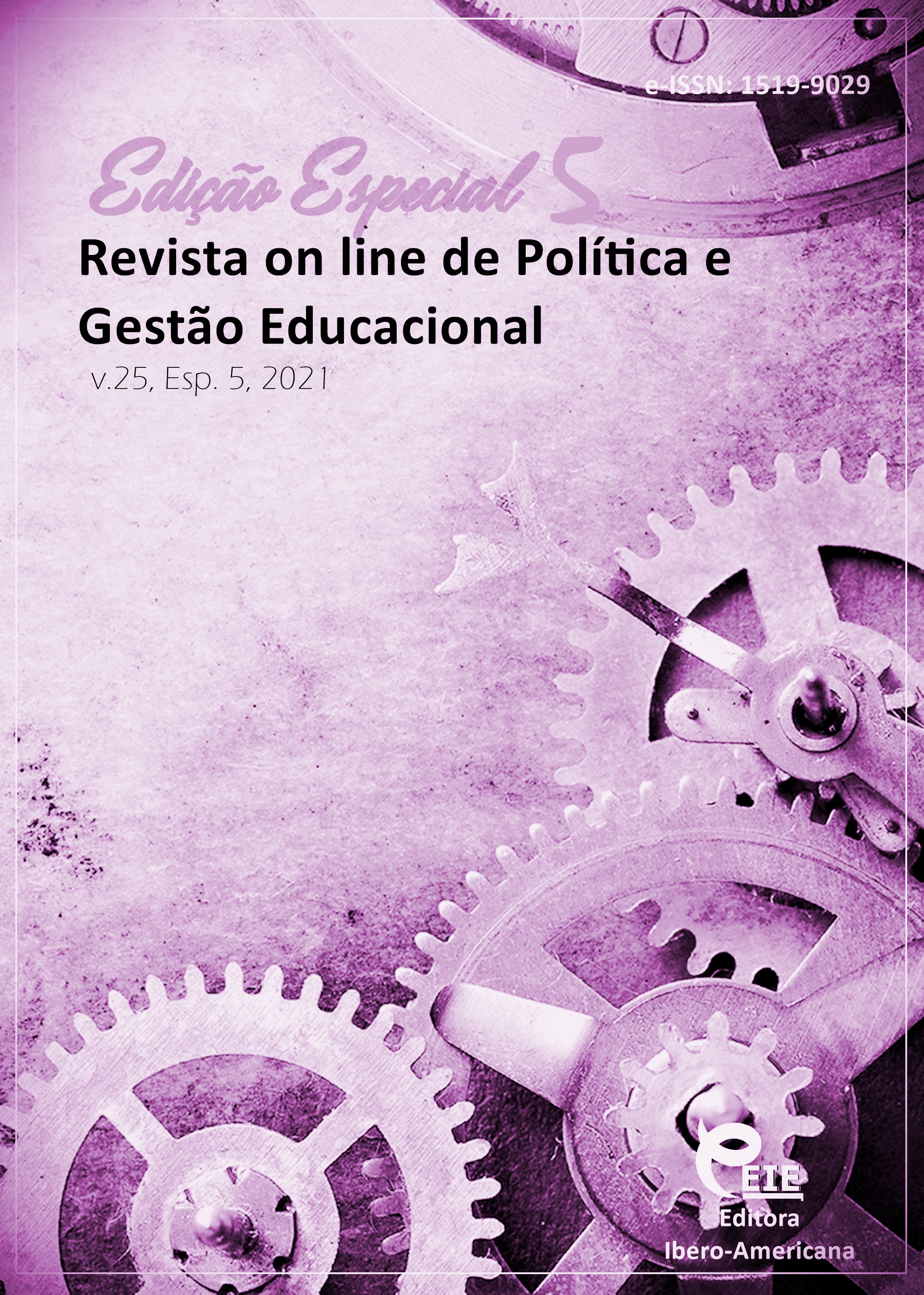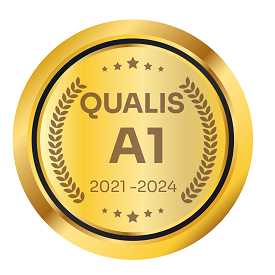Multimodalidad de la transmisión de conocimientos filológicos durante las actividades de aula utilizando las TIC
DOI:
https://doi.org/10.22633/rpge.v25iesp.5.15993Palabras clave:
Estrategias de aprendizaje multimodal, Actividades de clase, Tecnologías TICResumen
El artículo trata sobre estrategias de aprendizaje multimodal destinadas a transferir conocimientos filológicos con la ayuda de las tecnologías de la información y la comunicación (TIC). El uso de las TIC permite aplicar asociaciones visuales y crear imágenes espaciales que expresan propiedades importantes del objeto definidas claramente por medio de visualización dinámica (animación). Los autores señalan que el uso de las TIC en el ámbito se asocia a una serie de dificultades metodológicas, ya que requiere que un filólogo-educador posea un amplio abanico de competencias que van más allá del conocimiento humanitario. Se ofrece el software óptimo que permite crear construcciones audiovisuales (póster interactivo, animación por computadora, nube de etiquetas, mapa cognitivo etc.) para el proceso de estudio. El trabajo presenta los resultados de una investigación sociológica sobre la preparación de estudiantes de especialidades filológicas en universidades pedagógicas junto con los docentes de diferentes unidades educativas para la implementación de estrategias multimodales de enseñanza utilizando las TIC. Los autores demostraron la necesidad de introducir un curso integrador “Uso de las TIC en el estudio de disciplinas filológicas”.
Descargas
Citas
BARANOVSKA, O. B. Philological pedagogical technologies: transformation in changing conditions. In: Actual problems of science and practice: Abstracts of XІV international scientific and practical conference. Stockholm: Bookwire by Bowker, 2020. v. 14, p. 237-240. Disponível em: https://lib.iitta.gov.ua/720345/1/BOV_2020%2004%2027-28%20Sweden.pdf. Acesso em: 10 jan. 2021.
BLAKE, R. Technology and the four skills. Language Learning & Technology, n. 20, p. 129-142, 2016.
BOEHM, G.; MITCHELL, W. J. T. Pictorial versus Iconic Turn: Two Letters Culture. Theory and Critique, n. 50, p. 103–121, 2009.
BUZAN, T.; BUZAN, B. Supermyshlenie. Minsk: Popurri, 2003.
DOMÍNGUEZ ROMERO, E.; BOBKINA, J.; STEFANOVA, S. Teaching literature and language through multimodal texts. Hershey: IGI Global, 2018.
DOOLY, М. «I do which the question»: Students’ innovative use of technology resources in the language classroom. Language Learning & Technology, n. 22, p. 184-217, 2018.
FORD, S.; MINSHALL, T. Invited review article: Where and how 3D printing is used in teaching and education. Additive Manufacturing, n. 25, p. 131-150, 2019.
IKONNIKOVA, M.; KOMOCHKOVA, O. Modern online platforms and digital technologies in teaching linguistics in the US higher education practice. Information Technologies and Learning Tools, n. 73, p. 125-134, 2019.
KLOCHEK, H. D.; BARANIUK, O. F. Word and slide in a lecture: the problem of synergetic effect. Information Technologies and Learning Tools, n. 72, p. 26-40, 2019.
KOLOMIIETS, N.; YAREMENKO, N. Cross-cultural approach in modern philological education. In: Actual problems of development of education and science in the conditions of globalization: Ukrainian scientific conference. Dnipro: Roial Prynt, 2016. v. 1, p. 169-171.
KUCHERUK, O. A. et al. Using ICT tools for forming professional competences of future teachers of the Ukrainian language and literature. Information Technologies and Learning Tools, n. 71, p. 196-214, 2019.
LAASER, W.; TOLOZA, E. A. The changing role of the educational video in higher distance education. The International Review of Research in Open and Distributed Learning, n. 18, p. 264-76, 2017.
MAIA, B. The Professional Translator in the 21st Century: Education and Competences. Annals of the University of Craiova, n. 1, p. 59-76, 2016.
MAYER, R. E. Cognitive theory of multimedia learning cambridge handbook of multimedia learning. New York: Cambridge University Press, 2010.
MISHENINA, T. M.; GUSHKO, О. A. Międzynarodowej Konferencji Naukowo-Praktycznej, Globalne aspekty Ekonomii Światowej i Stosunków Międzynarodowych w warunkach niestabilności gospodarczej [Professional knowledge integration as a condition of future higher pedagogical education establishment philologists’ cognitive activity activation in the process of study of humanitarian disciplines]. Częstochowa: Akademia Polonijna, 2016.
OLIVIA, N.; SHAKLEIN, V. Preparation specifics of students-philologists: modern technologies of literary and linguistic text analysis. International Journal of Language Education, n. 3, p. 91-98, 2019.
OLKHOVSKA, A. Distance learning of future translators and interpreters: tools and experience of introduction. The Journal of V.N. Karazin Kharkiv National University. Series: Foreign Philology. Methods of Foreign Language Teaching, n. 91, 2020.
OSADCHA, K.; OSADCHYI, V.; KRUGLYK, V. The role of information and communication technologies in epidemics: an attempt at analysis. Ukrainian Journal of Educational Studies and Information Technology, n. 8, p. 62-82, 2020.
OSKOZ, A.; ELOLA, I. Digital stories: Bringing multimodal texts to the Spanish writing classroom. ReCALL, n. 28, p. 326-342, 2016.
PRIETO-VELASCO, J. A.; FUENTES-LUQUE, A. A collaborative multimodal working environment for the development of instrumental anda professional competences of student translators: an innovative teaching experience. The Interpreter and Translator Trainer, n. 10, p. 76-91, 2016.
RICE, P.; BEESON, P.; BLACKMORE-WRIGHT, J. Evaluating the Impact of a Quiz Question within an Educational Video. TechTrends, v. 63, p. 522-532, 2019.
SOROKINA, N.; SMOVZHENKO, L. Creation of professionally directed educational foreign informatively-communicative environment for future teachers-philologists. Information Technologies and Learning Tools, n. 66, p. 65-77, 2018.
UNESCO. UNESCO ICT Competency Framework for Teachers. 2019. Disponível em: https://iite.unesco.org/wp-content/uploads/2019/05/ICT-CFT-Version-3-Russian-1.pdf. Acesso em: 10 jan. 2021.
VORONKIN, O. Educational Video in the University: Instruments, Technologies, Opportunities and Restrictions. In: INTERNATIONAL CONFERENCE ON ICT IN EDUCATION, RESEARCH, AND INDUSTRIAL APPLICATIONS, 15., 2019, Kherson. Proceedings […]. Kherson, Ukraine, 2019. Disponível em: http://ceur-ws.org/Vol-2387/20190302.pdf. Acesso em: 10 jan. 2021.
YAREMENKO, N. V.; KOLOMIETS, N. Y. Pedagogical empowerment as a model of harmonization of psycho-cultural complexes “puer” architecture creation of the Prize of strategy for sustainable development. Public management, n. 18, p. 488-96, 2019.
YASHYNA, K.; KRUPNYK, O.; KARPENKO, O. Application of 3D Printing and 3D Scanning Technologies in Educational Activities. In: In: INTERNATIONAL CONFERENCE ON ICT IN EDUCATION, RESEARCH, AND INDUSTRIAL APPLICATIONS, 12., 2016, Kyiv. Proceedings […]. Kyiv, Ukraine, 2016. Disponível em: http://ceur-ws.org/Vol-1614/paper_17.pdf. Acesso em: 10 jan. 2021.
ZOZULIA, I. YЕ.; POZDRAN, YU. V.; SLOBODIANIUK, A. A. The role of distance learning of Ukrainian language as a foreign. Scientific Notes of the Taurida V. I. Vernadsky National University. Philology. Social Communications, n. 70, p. 33-38, 2020.
Publicado
Cómo citar
Número
Sección
Licencia
Derechos de autor 2021 Revista on line de Política e Gestão Educacional

Esta obra está bajo una licencia internacional Creative Commons Atribución-NoComercial-CompartirIgual 4.0.
Manuscritos aceitos e publicados são de propriedade da Revista on line de Política e Gestão Educacional. É vedada a submissão integral ou parcial do manuscrito a qualquer outro periódico. A responsabilidade do conteúdo dos artigos é exclusiva dos autores. É vedada a tradução para outro idioma sem a autorização escrita do Editor ouvida a Comissão Editorial Científica.











